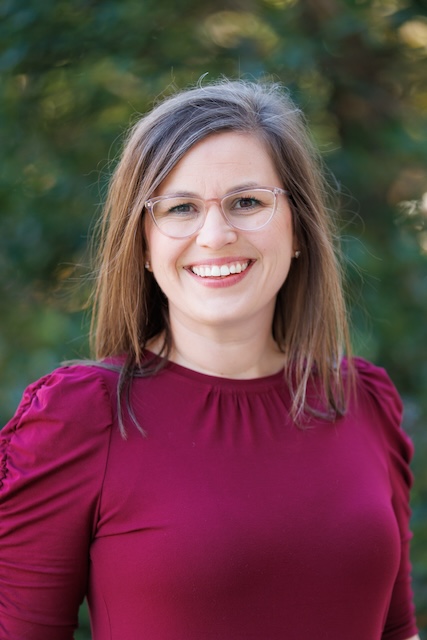
Dr. Kameron C. Carden is an assistant professor and director of clinical education in the Department of Communication Sciences and Disorders at Samford University. She has more than 15 years of experience serving young children who are deaf or hard of hearing as a speech-language pathologist and listening and spoken language specialist. As a practitioner, she has taught in oral preschool programs, provided early intervention services, and offered outreach to students and their teachers in public school settings throughout Alabama.
Dr. Carden is a board member of the Division for Communication, Language, and Deaf/Hard of Hearing (DCD) of the Council for Exceptional Children (CEC). She also serves on Alabama’s Special Education Advisory Panel (SEAP) and the board of directors for Alabama Hands and Voices as a parent of a child with a hearing difference. Her research interests include complex language development, ecologically valid language assessment practices, and eligibility determination for preschoolers who are deaf or hard of hearing using listening and spoken language.
Degrees and Certifications
- Ph.D. in Special Education, The University of Alabama
- M.A. in Speech-Language Pathology, The University of Florida
- B.S.Ed. in Communication Sciences and Disorders, The University of Georgia
Awards and Honors
- Leadership CEC, Council for Exceptional Children, 2024
- Recognition for Excellence in Dissertation Research, College of Education, The University of Alabama, 2024
- Finalist for Outstanding Dissertation, The University of Alabama Graduate School, 2024
- Student Scholarship Award Recipient, American Cochlear Implant Alliance, 2023
- Jasper Harvey Award for Excellence in Graduate Studies, Department of Special Education and Multiple Abilities, College of Education, The University of Alabama, 2022
Involvement and Professional Societies
- Division of Communication, Language, and Deaf/Hard of Hearing (DCD), Council for Exceptional Children, Board member and chair of the Committee on Deaf and Hard of Hearing
- Alabama Hands and Voices, Board of Directors
- Alabama State Department of Education (ALSDE) Special Education Advisory Panel, Panel member
- Alabama Early Hearing Detection and Intervention (EHDI) Learning Community, Member
Expertise
- Listening and language development
- Assessment practices
- Routines-based intervention
- Early language and literacy
- Children who are deaf or hard of hearing
- Caregiver coaching
- Speech perception and acoustics
- Narrative development and intervention
Recent Publications and Presentations
- Carden, K. C., Blaiser, K. M., Brooks, B. M., & McWilliam, R. A. (2024). Evidence-based practices for evaluating preschoolers who are deaf or hard of hearing using listening and spoken language for special education eligibility. Perspectives of the ASHA Special Interest Groups, 1–21. https://doi.org/10.1044/2024_persp-24-00081
- Carden, K. C., McWilliam, R. A., McLeod, R. H., & Fedewa, M. P. (2024). Narrative intervention for preschoolers who are deaf and hard of hearing using listening and spoken language: A pilot study. Language, Speech, and Hearing Services in Schools, 55(2), 510–528. https://doi.org/10.1044/2023_lshss-23-00063
- Fedewa, M. P., Watkins, L., Carden, K., & Grbac, G. (2024). Effects of a teacher-facilitated peer-mediated intervention on social play of preschoolers with autism. Journal of Autism and Developmental Disorders. https://doi.org/10.1007/s10803-024-06320-7
- McLeod, R. H., Hardy, J. K., & Carden, K. C. (2023). A review of the literature: Distance coaching in early childhood settings. Journal of Early Intervention, 46(1), 3–18. https://doi.org/10.1177/10538151231159639
- Carden, K. C. (2023). Communication as a two-way street? Creating opportunities for engagement during meaningful language routines. In P. Brillante, J. Chen, S. Cuevas, C. Dundorf, E. B. Hoffman, D. R. Meier, G. Mindes, & L. R. Roy (Eds.), Casebook in Developmentally Appropriate Practice in Early Childhood Programs. The National Association for the Education of Young Children.
- Carden, K. C. (July 2024). Special education eligibility determination practices and perceptions for preschoolers using listening and spoken language [Pediatric (Re)habilitation Connect Forum]. American Cochlear Implant Alliance CI2024 Conference, Vancouver, Canada.
- Blaiser, K. & Carden, K. C. (July 2024). Language sampling to improve outcomes for children who are deaf or hard of hearing [Conference session]. ASHA Working Together in Schools: Whole Child, Whole Team Conference, Virtual.
- Conley, S. J., Carden, K. C., Conners, F. A., McDonough, I., Merrill, E. C., Abbeduto, L. J., & Thurman, A. J. (April 2024). Early cognitive decline in Down syndrome project: Baseline behavioral/affect measures [Poster presentation]. 2024 National Institute of Health (NIH) INCLUDE Investigators Meeting, Bethesda, MD.
- Blaiser, K., Ben-Jacob, A., Richlin, B., Carden, K., & Puhlman, J. (March 2024). Identifying the gaps between best practice and service delivery in serving children who are DHH in early intervention [Poster presentation]. Early Hearing Detection and Intervention (EHDI) Conference, Denver, CO.
- Carden, K. C., McWilliam, R., & McLeod, R. (November 2023). Evidence-based assessment practices for preschoolers who are D/HH [Conference session]. Division of Exceptional Children (DEC) Annual Conference, Minneapolis, MN.
Research Area
- School-baded practitioner evaluation and assessment perceptions and practices
- Special education eligibility determination practices for preschoolers who are deaf or hard of hearing using listening and spoken language
- Narrative intervention
- Ecologically valid assessment practices for young children who are deaf or hard of hearing using listening and spoken language
- Lived experiences of deaf mothers of children who are deaf or hard of hearing using listening and spoken language
